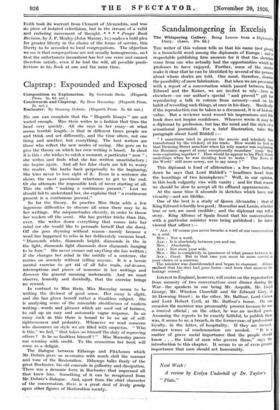Claptrap : Expounded and Exposed Rochester. By Bonamy Dobrde. (Hogarth
Press. 2s. 6d. net.)
No one can complain that the " Hogarth Essays " are not varied enough. Miss Stein writes in a fashion that tires the head very quickly. All she says in her essay—at what seems terrible length—is that in different times people see and think and act differently, and the time alters, not one thing and another, but everything. The best writers are those who reflect the new modes of seeing. She goes on to give the theory on which her own writing is based. In short it is this : she wishes to catch a moment, a particular " now " ; she writes and finds what she has written unsatisfactory ; she begins again. And all her false starts are left to worry the reader. She harks back perpetually to the beginning. She tries never to lose sight of it. Even in a sentence she shows the most passionate reluctance to get to the end. Or she attempts the impossible task of never starting at all. This she calls " making a continuous present." Lest we should fail to understand her, she explains that " a continuous present is a continuous present."
So far the theory. In practice. Miss Stein adds a few ingenious difficulties to obscure all sense there may be in her writings. She mispunctuates cleverly, in order to throw her readers off the scent. She has prettier tricks than this, even. She writes down everything that comes into her mind (or she would like to persuade herself that she does). Off she goes rhyming without reason—merely because a word has happened to echo in her deliberately vacuous head. " Diamonds white, diamonds bright, diamonds in the in the light, diamonds light diamonds door diamonds hanging to be four." She never crosses out anything she has written ; if she changes her mind in the middle of a sentence, she carries on serenely without telling anyone. It is a heroic mental exercise to get rid of all false trails, cul-de-sacs, interruptions and pieces of nonsense in her writings and discover the general meaning underneath. And we must observe, honestly and decidedly, that the exercise brings no reward.
In contrast to Miss Stein, Miss Macaulay seems to be writing the divinest of good sense. Her essay is slight, and she has given herself rather a thankless subject. She is analysing some of the miserable shoddinesses of modern writing—words and phrases which are used out of laziness, to call up an easy and automatic vague response. In an essay such as this there is bound to be an air of self- righteousness and pedantry. Whenever we read someone who discourses on style we are filled with suspicion. " Who is this," we feel, " that takes on himself the duty of reproving others ? Is he so faultless himself ? " Miss Macaulay passes our scrutiny with credit. To the censorious her book will come as a delight.
The dialogue between Etherege and FitzJames which Mr. Dobree gives us re-creates with much skill the manner and tone of the Restoration. Etherege talks freely of the great Rochester, his old comrade in gallantry and dissipation. There was a demonic force in Rochester that impressed all that knew him. Something of it can be recaptured from Mr. Dobree's dialogue. And, apart from the chief character of the conversation, there is a great deal of lively gossip upon other figures. of Restoration society.






























































 Previous page
Previous page